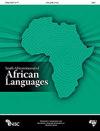伊博语词缀中的高级舌根效应:来自Èwùlù的视角
IF 0.4
0 LANGUAGE & LINGUISTICS
引用次数: 0
摘要
AbstractÈwùlù (Igboid:西贝努埃-刚果,尼日利亚南部)是一种2IU型方言,在其词缀形态中具有相当普遍的高级舌根(ATR)效应。因此,词缀中的元音和相邻词根语素中的元音具有相同的ATR特征值,后者语素决定了前者语素中的元音具有何种特定的ATR值。这种由词根控制的ATR/元音和谐系统在尼日利亚三角洲州的伊博西部方言(特别是Èwùlù)中还有待独立探索。因此,本文的目标是描述ATR从濒临灭绝的方言的根到相邻词缀的传播,以期促进对元音特征的远距离同化的类型学的理解,尽管有辅音的介入。为了深刻地捕捉词根到词缀的atr传播效应,本研究采用了自分词理论,其机制是使用联想线将特征与其特定的旋律单位联系起来,这些旋律单位在语音表征的不同层次上独立运作。这项研究的发现表明了这样一种概括:如果一个词根元音的主要和声特征是[+ATR],那么相邻的前缀或后缀就具有相同的特征,否则就具有相反的特征[- ATR]。本文章由计算机程序翻译,如有差异,请以英文原文为准。
Advanced tongue root effect in Igbo affixation: perspectives from Èwùlù
AbstractÈwùlù (Igboid: West Benue–Congo, southern Nigeria) is a type 2IU dialect with a rather pervasive advanced tongue root (ATR) effect in its productive affixation morphology. Consequently, all vowels in affixes and those in adjoining root morphemes acquire the same value for ATR feature, with the latter morphemes determining with what specific ATR value the vowels in the former morphemes are specified. This sort of root-controlled ATR/vowel harmony system is yet to be independently explored in western dialects of Igbo (in particular, Èwùlù) spoken in Delta State, Nigeria. The goal of this article, therefore, is to describe the spread of ATR from roots to the adjoining affixes of the endangered dialect, with a view to advancing understanding of a typology of long-distance assimilation of vowel features across a string of vocalic elements in stems despite an intervening string of consonants. In order to insightfully capture the ATR-spread effect from roots to affixes, the study employs autosegmental theory, the mechanism of which uses association lines to link features to their specific melodic units operating independently on different tiers in phonological representations. The finding of this study showed this generalisation: if the dominant harmony feature of a root vowel is [+ATR], the adjoining prefix or suffix takes on the exact feature, otherwise it takes on the opposing feature, [−ATR].
求助全文
通过发布文献求助,成功后即可免费获取论文全文。
去求助
来源期刊

South African Journal of African Languages
LANGUAGE & LINGUISTICS-
CiteScore
0.50
自引率
0.00%
发文量
30
期刊介绍:
The South African Journal of African Languages is a peer-reviewed research journal devoted to the advancement of African (Bantu) and Khoi-San languages and literatures. Papers, book reviews and polemic contributions of a scientific nature in any of the core areas of linguistics, both theoretical (e.g. syntax, phonology, semantics) and applied (e.g. sociolinguistic topics, language teaching, language policy), and literature, based on original research in the context of the African languages, are welcome. The journal is the official mouthpiece of the African Language Association of Southern Africa (ALASA), established in 1979.
 求助内容:
求助内容: 应助结果提醒方式:
应助结果提醒方式:


